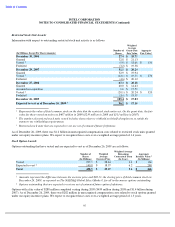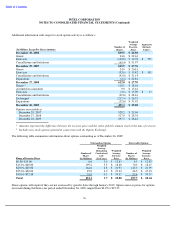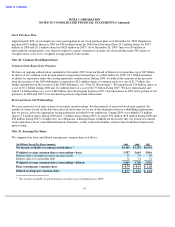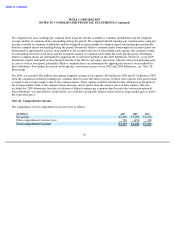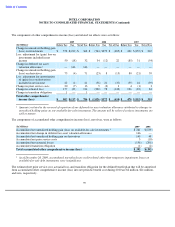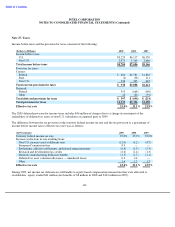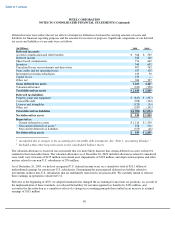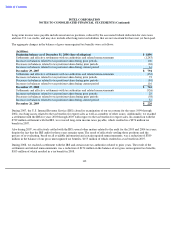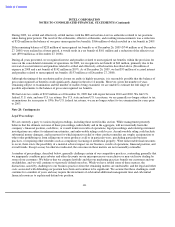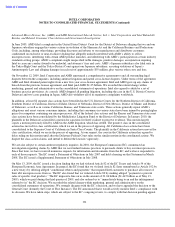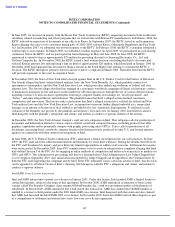Intel 2009 Annual Report Download - page 116
Download and view the complete annual report
Please find page 116 of the 2009 Intel annual report below. You can navigate through the pages in the report by either clicking on the pages listed below, or by using the keyword search tool below to find specific information within the annual report.
Table of Contents
INTEL CORPORATION
NOTES TO CONSOLIDATED FINANCIAL STATEMENTS (Continued)
In June 2005, we received an inquiry from the Korea Fair Trade Commission (KFTC) requesting documents from our Korean
subsidiary related to marketing and rebate programs that we entered into with Korean PC manufacturers. In February 2006, the
KFTC initiated an inspection of documents at our offices in Korea. In September 2007, the KFTC served us an Examination
Report alleging that sales to two customers during parts of 2002–2005 violated Korea’s Monopoly Regulation and Fair Trade
Act. In December 2007, we submitted our written response to the KFTC. In February 2008, the KFTC’s examiner submitted a
written reply to our response. In March 2008, we submitted a further response. In April 2008, we participated in a pre-hearing
conference before the KFTC, and we participated in formal hearings in May and June 2008. In June 2008, the KFTC
announced its intent to fine us approximately $25 million for providing discounts to Samsung Electronics Co., Ltd. and
TriGem Computer Inc. In November 2008, the KFTC issued a final written decision concluding that Intel’s discounts had
violated Korean antitrust law and imposing a fine on Intel of approximately $20 million, which Intel paid in January 2009. In
December 2008, Intel appealed this decision by filing a lawsuit in the Seoul High Court seeking to overturn the KFTC’s
decision. The KFTC through its attorneys filed its answer to Intel’s complaint in March 2009. Thereafter Intel and the KFTC
will provide arguments to the court in sequential briefs.
In November 2009, the State of New York filed a lawsuit against Intel in the U.S. District Court for the District of Delaware.
The lawsuit alleges that Intel violated federal antitrust laws; the New York Donnelly Act, which prohibits contracts or
agreements to monopolize; and the New York Executive Law, which proscribes underlying violations of federal and state
antitrust laws. The lawsuit alleges that Intel has engaged in a systematic worldwide campaign of illegal, exclusionary conduct
to maintain its monopoly power and prices in the market for x86 microprocessors through the use of various alleged actions,
including exclusive or near-exclusive agreements from large computer makers in exchange for “loyalty payments” and
“bribes,” and other alleged threats and retaliation. The plaintiff claims that Intel’s alleged actions harmed consumers,
competition, and innovation. The lawsuit seeks a declaration that Intel’s alleged actions have violated the federal and New
York antitrust laws and the New York Executive Law, an injunction to prevent further alleged unlawful acts, unspecified
damages in an amount to be proven at trial, trebled as provided for by law, restitution, disgorgement, $1 million for each
violation of the Donnelly Act proven by the plaintiff, and attorneys’ fees and costs. In January 2010, Intel filed its answer.
Intel disagrees with the plaintiff’s allegations and claims, and intends to conduct a vigorous defense of the lawsuit.
In December 2009, the New York Attorney General’s staff served a subpoena on Intel. That subpoena calls for production of
documents and information related to various aspects of Intel’s notebook computer business, including products that offer
graphics capabilities and/or potentially compete with graphic processing units (GPUs). It also calls for production of all
documents concerning Intel’s notebook computer business that Intel previously produced to other U.S. and foreign antitrust
agencies in connection with their antitrust investigations of Intel.
In June 2008, the U.S. Federal Trade Commission (FTC) announced a formal investigation into our sales practices. In June
2009, the FTC staff asked for additional information and testimony by some Intel witnesses. During the months that followed,
the FTC staff broadened its inquiry and gave Intel only limited opportunities to address staff concerns. Settlement discussions
were unsuccessful. In December 2009, three FTC commissioners voted to issue an administrative complaint alleging that Intel
had violated Section 5 of the FTC Act by engaging in unfair methods of competition and unfair acts or practices in markets for
CPUs and GPUs. This administrative proceeding will lead to a hearing before Chief Administrative Law Judge Chappell that
is set to begin in September 2010. Any initial decision rendered by Judge Chappell can be appealed to the Commissioners by
both the FTC staff supporting the complaint and by Intel. If the FTC ultimately issues a decision adverse to Intel, that decision
can be appealed to a Federal Circuit of Intel’s choosing. Intel disagrees with the FTC’s allegations and claims, and intends to
conduct a vigorous defense.
Intel/AMD Cross
-License Agreement
Intel and AMD entered into a patent cross-license in January 2001. Under that license, Intel granted AMD a limited license to
certain Intel patents, subject to the terms of that agreement. In October 2008, AMD announced its intention to form a joint
venture called The Foundry Company (later renamed GlobalFoundries Inc.) with two investment entities of the Emirate of
Abu Dhabi. In March 2009, AMD announced that it had closed this transaction. AMD has claimed that GlobalFoundries is
entitled to a license to Intel patents under the 2001 Intel/AMD cross-license. Intel disagreed with that claim and also claimed
that AMD had breached the Intel/AMD 2001 cross-license. In November 2009, Intel and AMD resolved these disputes as part
of a comprehensive settlement and entered into a new five-year cross-license agreement.
105


